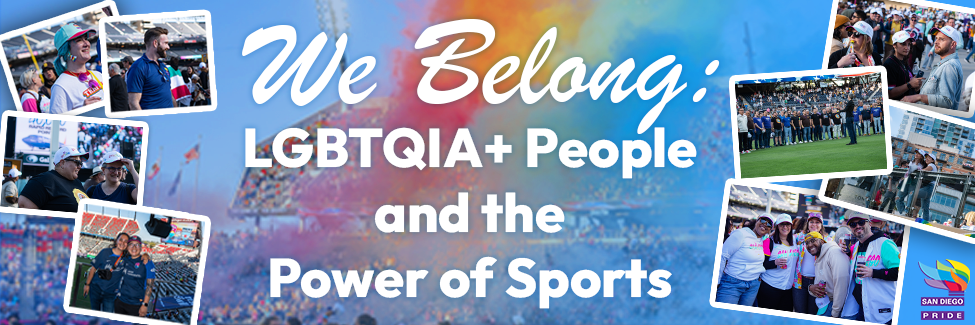We Belong: LGBTQIA+ People and the Power of Sports

There are few things in life as energizing and unifying as sports. The roar of the crowd. The thrill of the game winning goal. The quiet focus of an athlete stepping up to the plate. Whether on the field or in the stands, sports bring us together in a way that transcends the things that could divide us: language, background, politics, the Oxford comma.
Sports teach discipline, teamwork, and resilience. They give us moments of joy, pride, and connection – and that’s exactly why WE BELONG in sports culture. But historically we have certainly seen the ways that LGBTQIA+ people have been excluded from that joy.
The history of sports, especially professional athletics, is deeply intertwined with a legacy of homophobia and transphobia. For decades and even today, LGBTQIA+ athletes are forced to hide their identities, fearing rejection, discrimination, or worse, the end of their careers. Trans athletes at all levels are facing unprecedented levels of scrutiny and exclusion, with an increasing number of policies targeting their ability to participate in sports, trying to bar trans athletes from experiencing that joy, pride, and connection. In women’s sports, for instance, homophobia is too often compounded by thinly veiled sexism, transphobia, and racism – labeling strong, successful athletes as “too masculine”, “too much,” or assuming that their queerness must be hidden.
Even now, those undercurrents of homophobia still appear. At the first home match of our new Major League Soccer team, San Diego FC, a small group of fans attempted to revive a known homophobic chant in the stands. But the club responded swiftly and clearly: homophobia has no place in San Diego’s sports culture. That kind of response matters. It sends a message that inclusion isn’t optional – it’s part of who we are.
We’ve come a long way, and local progress is real. One significant example is OUT at the Park, a San Diego tradition that began as an informal “gay day” at a Padres game and has grown into one of the biggest LGBTQIA+ fan nights in professional sports (more than a decade!). Similar Pride Nights have been established in professional sports leagues, and we’re thrilled to see the momentum sustaining here. Both San Diego FC and Wave FC are planning Pride events this season—stay tuned for more on those.
These Pride Night celebrations aren’t just marketing gimmicks. They’re meaningful signals to LGBTQIA+ fans and athletes that we’re seen, welcomed, and celebrated in these spaces. As our community addresses the constant threats to our wellbeing, livelihood and basic human rights, that sense of belonging extends to the players too. LGBTQIA+ athletes are competing – and thriving – at every level.
Pro leagues like the WNBA and NWSL have long been home to OUT athletes, and more recently, NHL, and MLB have begun to shift as well. Whether it’s Megan Rapinoe taking a stand on the global stage, or Luke Prokop becoming the first out NHL player under contract, visibility continues to propel our movement forward.
Still, for every professional athlete who comes out, there are countless others navigating the quieter, more complicated reality of being LGBTQIA+ in a sporting world that hasn’t always embraced them. Visibility is powerful—but it’s not enough on its own.
True inclusion goes beyond annual Pride Night celebrations. It’s not just rainbow flags in the stands – it’s real policies. Real representation. Real security. It’s the rec leagues from softball, football, dragon boating, and kickball – that welcome queer and trans athletes without hesitation. It’s the coaches who ask for pronouns and do not tolerate homophobic and transphobic comments. It’s the fans who shut down hate in their own sections. It’s building a culture where the next generation never has to choose between being themselves and playing the sports they love.
Let’s be clear: LGBTQIA+ people belong in sports. On the field, on the sidelines, in the stands, and behind the scenes. We are athletes, fans, coaches, trainers, referees, and leaders. Because when LGBTQIA+ people are free to bring our full selves into sports, everyone benefits. And we prove – again and again – that WE BELONG.
Jen LaBarbera
Director of Education & Advocacy
Joslyn Hatfield
Director of Marketing & Communications